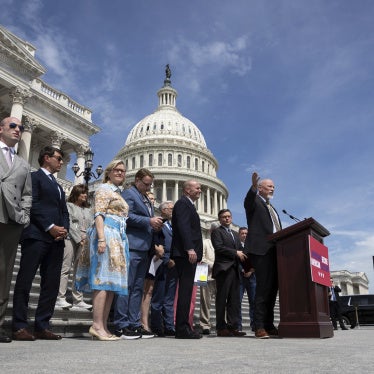The United States acknowledged the practice of torture and ill-treatment in the U.S., but stated that it was not government policy. Although these abuses are widespread and rarely prosecuted, the report claims that they are "aberrational" and typically lead to prosecutions when they do occur.
"Human Rights Watch has long insisted that political will is essential in order to end human rights violations, including torture and other serious ill-treatment. The federal government must pursue these issues with detailed plans to use all legal and political means available to it to put an end to abusive practices by federal, state and local officials," said Kenneth Roth, executive director of Human Rights Watch.
The report was submitted to the United Nations to describe U.S. compliance with the Convention against Torture and Other Cruel, Inhuman or Degrading Treatment or Punishment, which the U.S. ratified in October 1994. The U.S. compliance report was submitted four years late.
"The government has confronted the undeniable and unfortunate reality that the poor, minority, and criminal offenders, in particular, are subjected to treatment prohibited under this treaty and denounced by the U.S. when it occurs in other countries," said Roth.
While acknowledging the existence of abuses, the report downplays the pervasiveness of impunity for those abuses. Indeed, the report suggests that most instances of torture or other ill-treatment are prosecuted. In fact, the vigorous prosecution of the New York City police officers accused of beating and sodomizing Abner Louima, for example, was extraordinary. It is rare for cases without massive press attention to be prosecuted at all. Police and prison officers who use excessive force amounting to torture or cruel, inhuman and degrading treatment are typically not held responsible for those acts through the failure to prosecute or discipline them administratively. "For every Louima case prosecuted in good faith, there are many other instances of torture and serious ill treatment in which brutal officers enjoy impunity," said Roth.
The report also glosses over the difficulties faced by victims when they seek legal redress, such as restrictions on access to courts, inadequate legal representation, procedural constraints, and narrow legal interpretations that limit the scope and efficacy of laws prohibiting torture and other serious ill-treatment.
Human Rights Watch and others have made numerous recommendations for changes in law and practice that would help end abuses and provide better legal protections when they do occur. The Clinton administration should move to implement these, and other, reforms. Progress will only be possible if the federal government is willing to use its political weight, moral suasion, and other means at its disposal to press federal, state, and local officials to meet their human rights obligations described in this report.







